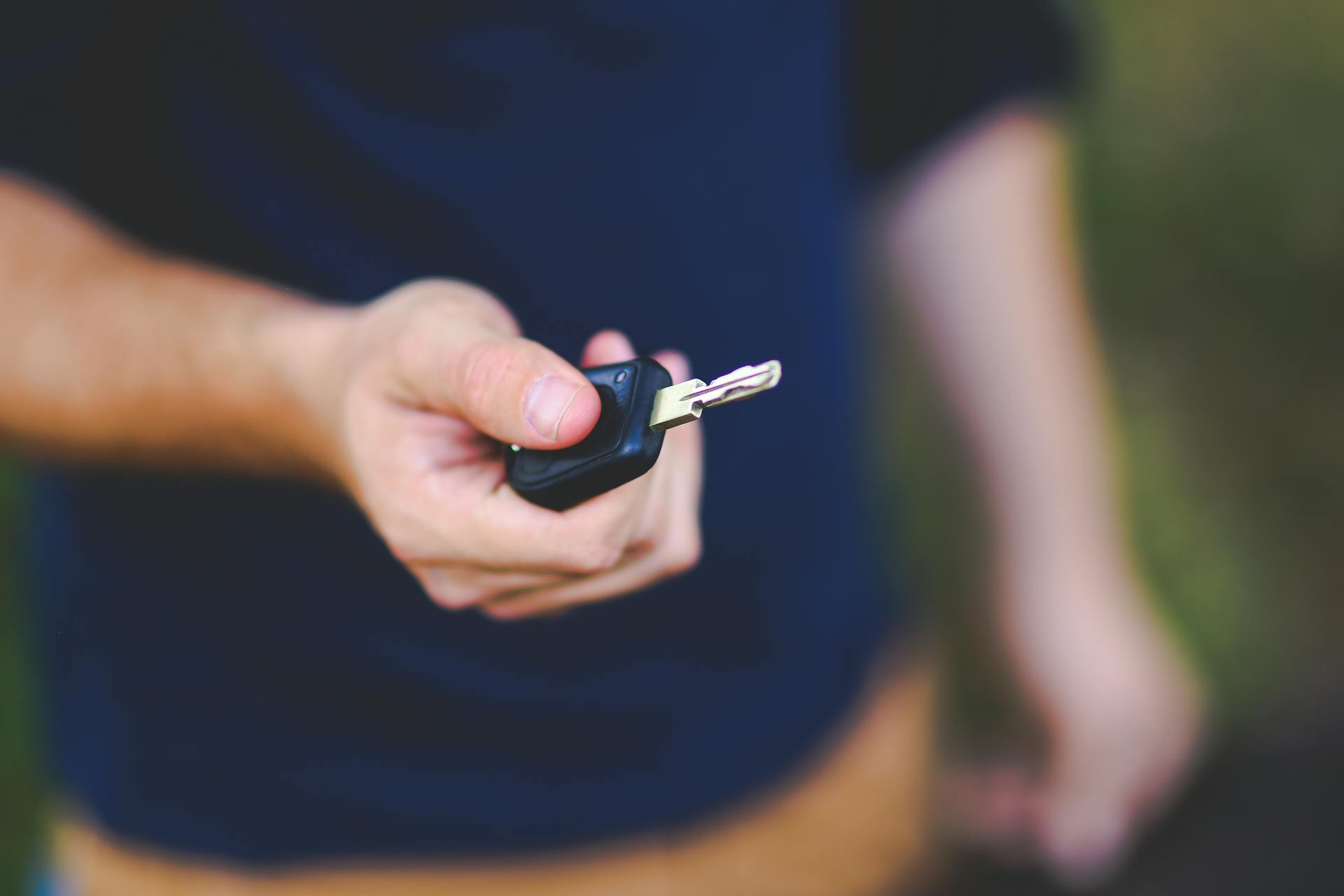
If someone dies with an active car lease, the lease agreement typically doesn't automatically cancel.
The leasing company will likely send a notification to the estate or the person's next of kin, informing them of their options.
The deceased person's estate or next of kin must decide what to do with the lease.
Additional reading: Estate Inherited Ira
Car Lease Details
Reviewing the car lease contract is the first step as the executor of the estate. This will help you understand the terms and obligations of the lease.
The lease may deem death to be an early termination of the lease, which means any payment arrangements may continue. If there's a co-signer, they may become liable for all future payments.
You should keep up with all lease payments while reviewing the contract and your rights or obligations. Failing to make payments may limit your options regarding the vehicle.
Notify the dealership or leasing agency as soon as possible about the death of the lessee. They'll likely want proof of death, such as a death certificate, and documentation showing you're authorized to act on behalf of the estate.
Explore further: Federal Law Assume Mortgage after Death
The leasing company may have provisions that allow estate executors to pay a flat fee and stop all lease payments after the lessee passes away. This can be a good option to explore.
It's a good idea to talk with an attorney to determine if the estate is liable for the remaining monthly payments. They can help you navigate the contract and find a suitable solution.
A unique perspective: Is a Joint Account Part of an Estate
Options
You have several options when dealing with a car lease after someone passes away. The first option is to either pay out the lease or come to an agreement with the lease company to return the car and pay any outstanding fees.
Alternatively, the lease can possibly be transferred to another person, such as a family member, which may decrease any outstanding claims against the estate and allow more assets to be passed along to beneficiaries. This option may come with a transfer fee charged by the dealer.
Lease Terms

Lease terms are crucial to understanding your options after a loved one passes away. The lease may deem death to be an early termination of the lease.
The lease contract will determine the fate of the lease. If the lease has a co-signer, they may become liable for all future payments.
You should review the lease to understand your rights and obligations. Failing to make lease payments may limit your future options regarding the vehicle.
The leasing company may have provisions for estate executors to pay a flat fee and stop all lease payments after the borrower passes away. Some companies may include clauses for additional fees for processing repossession paperwork, cutting new keys, or reconditioning charges.
You'll need to notify the dealership or leasing agency about the lessee's death, providing proof of death and documentation of your authority to act on behalf of the estate. The company may want to see a death certificate.
Suggestion: Car Lease Limited Company
Options

You have several options when dealing with a leased car after the owner's passing.
The first option is to either pay out the lease or come to an agreement with the lease company to return the car and pay any outstanding fees.
You can also transfer the lease to another person, such as a family member, which can decrease any outstanding claims against the estate.
Transferring the lease can be a good option if you want to keep the car in the family.
There may be a transfer fee charged by the dealer, but it can be worth it to avoid paying out the lease.
It's essential to communicate with the car dealership to determine the best course of action.
You can also explore canceling the lease agreement early if the car was not willed to a beneficiary.
To do this, you'll need to contact the organization in charge of the lease agreement.
If the lease is with Mobilize Financial Services, you should contact them directly to discuss your options.
They advise sending an email with a certified copy of the death certificate to initiate the process.
For more insights, see: Transfer Lease Car
Returning a Leased Car After Death
If the car is not willed to a beneficiary, you can opt to cancel the lease agreement early. This can be done by contacting the organization in charge of the lease agreement, as advised by LeasePlan. They require a copy of the death certificate to be emailed to them.
The process for returning a leased car after death can be complex, but it's essential to notify the dealership or leasing agency as soon as possible. They will likely want proof of the death of the lessee, such as a death certificate, and documentation indicating that you are legally authorized to act on behalf of the estate.
Lessor's Responsibilities
When a lessee passes away, the lessor's responsibilities kick in. The lessor is required to take possession of the vehicle, as stated in the lease agreement.
The lessor will typically send a letter to the estate or the lessee's next of kin, informing them of the lease agreement and the need to return the vehicle. This letter must be sent within a certain time frame, which can vary depending on the jurisdiction.
A fresh viewpoint: Car Lease Agreement California

The lessor has the right to repossess the vehicle, but they must follow the proper procedures to avoid any potential disputes. The lessor may also be able to sell the vehicle to recoup any losses.
In some cases, the lessor may be able to waive certain fees or penalties, especially if the lessee's estate is unable to pay. However, this decision is typically up to the lessor.
The lessor's responsibilities do not end with the repossession of the vehicle. They must also handle the sale of the vehicle and distribute the proceeds to the estate or other interested parties.
Return the Car
If the car is not willed to a beneficiary, you can opt to cancel the lease agreement early.
To cancel the lease, you'll need to get in touch with the organization in charge of the lease agreement. This is usually the leasing company or the bank that financed the lease.
Returning the Car to the Lessor
You'll need to contact the leasing company as soon as possible to inform them of the lessee's passing. This is usually done by calling their customer service number, as mentioned in Example 3, where Lex advises to call their Credit Control Team on 0800 015 4140.
The leasing company will likely require a copy of the death certificate, which you can email to them, as LeasePlan suggests in Example 4. They'll then work with you to arrange collection of the vehicle.
To determine the next steps, it's a good idea to review the lease agreement, as mentioned in Example 1. This will help you understand the terms of the lease and any obligations the estate may have.
Here's a brief overview of what you can expect from the leasing company:
Keep in mind that the leasing company may have specific requirements or procedures for returning a leased car after death, so it's essential to follow their instructions carefully.
Returning the Car to a Dealer

Returning the car to a dealer can be a challenging and emotional experience, especially after losing a loved one. If the lease agreement requires the car to be returned to a dealer, you'll need to arrange for transportation and ensure the vehicle is in good condition, as specified in the "Preparing the Car for Return" section.
If you're unable to return the car in person, you can designate a representative to do so on your behalf. This person will need to provide identification and proof of their authority to act on your behalf, as detailed in the "Designating a Representative" section.
The dealer will inspect the vehicle and determine if there are any damages or excessive wear and tear. This inspection will be based on the "Inspection and Fees" guidelines outlined in your lease agreement.
You'll need to provide the dealer with the necessary documentation, including the lease agreement and any supporting paperwork, as specified in the "Required Documents" section.
The dealer will then calculate any fees or charges associated with returning the car, which may include a disposition fee, as mentioned in the "Fees and Charges" section.
Expand your knowledge: What Happens If the Executor of a Will Dies?
Frequently Asked Questions
What if my husband passed away and the car is in his name?
If your husband passed away and the car is in his name, you may automatically become the owner of the vehicle, depending on your state's laws. Check your state's specific regulations for more information on vehicle ownership after a spouse's passing
Sources
- https://www.survivedby.net/what-to-do-with-my-loved-ones-car-lease-after-they-die/
- https://wilsonlawgroup.com/carlease/
- https://www.epgdlaw.com/what-happens-to-a-car-lease-after-the-car-lessees-death/
- https://everloved.com/articles/post-death-logistics/what-happens-with-a-car-loan-or-car-lease-when-someone-dies/
- https://xcitecarleasing.co.uk/guides/personal-car-leasing/ending-a-lease/deceased/
Featured Images: pexels.com


